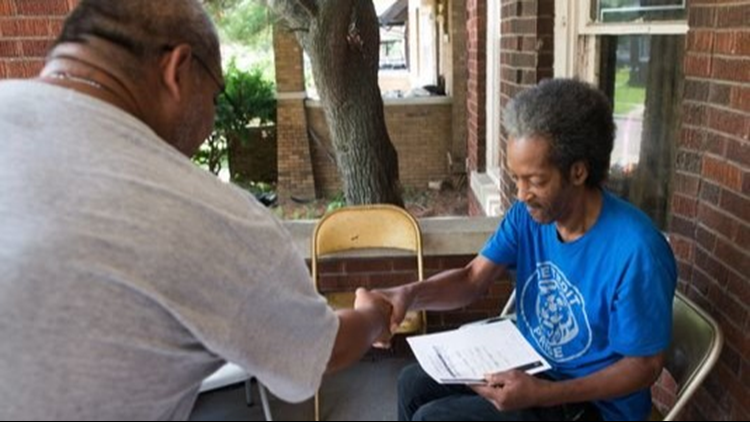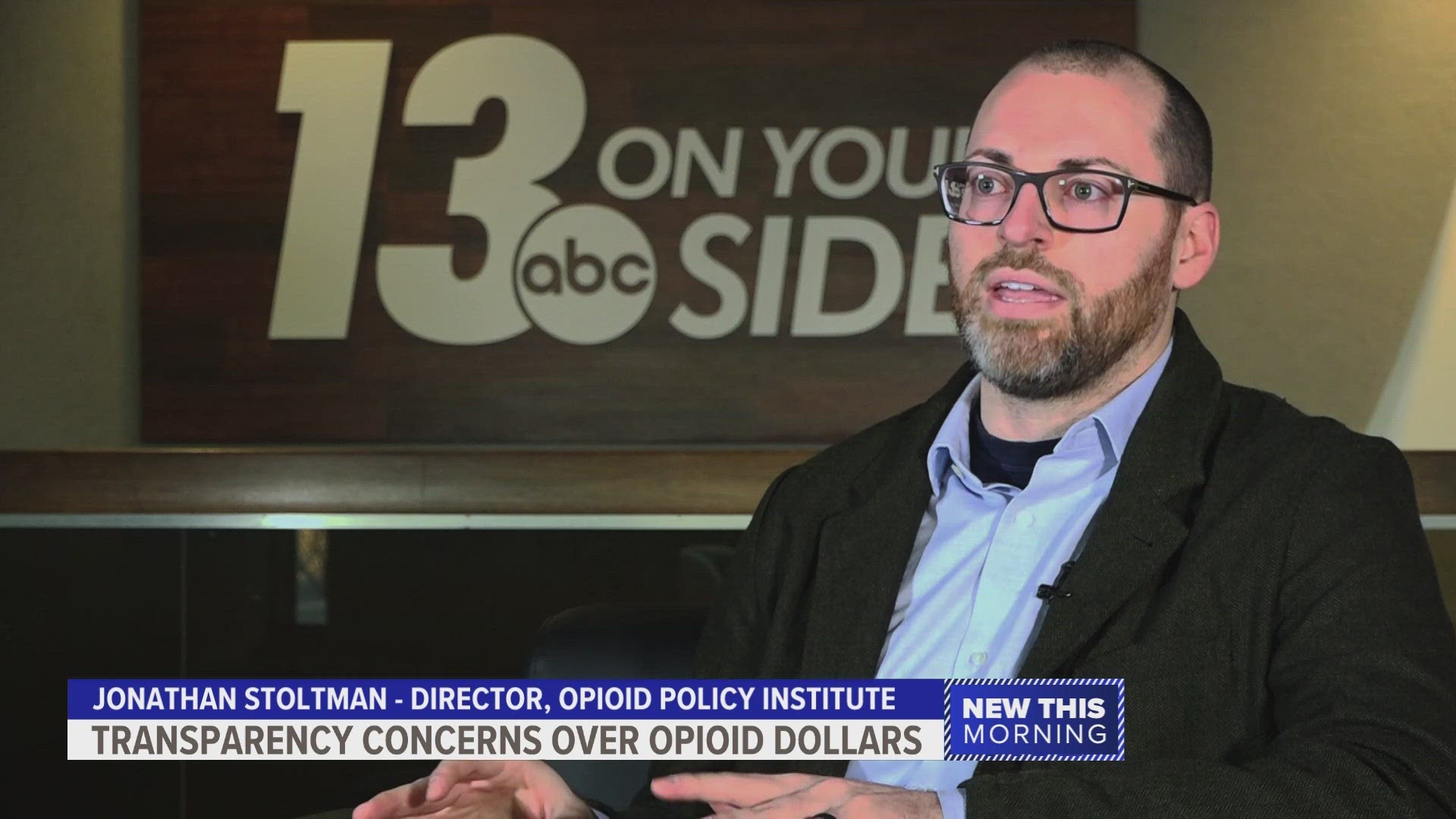They started with role playing and a prayer circle before a group of about a dozen people hit the streets in Detroit to knock on doors and find the people who are classified as “infrequent voters.”
Their mission: convince those voters that casting ballots on Tuesday and again in November can affect the issues that concern them most — high auto insurance rates, water shutoffs and blight in their neighborhoods.
“You know, you usually see politicians coming around telling us what we want to hear. They offer to build you a cement pond and they never build it,” canvasser Duane Clark, of Detroit, said in rehearsing the opening line he often uses when talking with voters.
“It’s all about turning empathy into energy. That’s what our get-out-the-vote effort is all about,” said DeJuan Bland, an organizer with MOSES Action, a faith-based group that is engaged in generating more community activism. “It’s not just putting someone in office, but putting our agenda out into the community.”
MOSES is teaming up with several national progressive groups — the Center for Community Change Action, Planned Parenthood Action, Color of Changeand SEIU (the Service Employees International Union) — to boost voter turnout in the 2018 election cycle. It’s a $10-million effort to reach 650,000 Michigan voters in 12 counties at least five times each before the Nov. 6 election, said Lindsay Maas, elections director for the project.
“We’re looking for a new universe of voters, based on their past voting history. One type is a new voter. Another are folks who voted in 2008 and never came back or people who usually don’t vote in midterm elections,” Maas said. “And we’re leading with issues. That’s a surprise to people that we’re not automatically talking about candidates. But after the primary, we’ll be talking about candidates.”
Duane Clark of Detroit and Corell Jones of Detroit role play a door-knocking scenario during a canvasser training by MOSES Action at the Chapel Hill Baptist Church in Detroit on Aug. 2, 2018. (Photo: Cameron Pollack, Detroit Free Press)
Sometimes they're successful, like when MOSES volunteers talked with Ray Perry on Detroit's west side. He said the only thing that was bothering him was the blighted house next door and that he planned to vote on Tuesday as long as he got an absentee ballot in time. Other times, they encountered people who either didn't plan to vote or couldn't because they weren't registered.
The project is just one of the many efforts by organizations outside of Michigan coming to the state to try to influence the election. From registering voters to contributing to candidates to buying millions in television ad time, the groups are trying to capitalize on a politically charged environment that erupted after the 2016 elections.
And while some of the programs have already started in the weeks and months leading up to Michigan’s primary election on Tuesday, even more will begin after all of Tuesday’s votes have been cast and counted.
At least eight out-of-state organizations, from the Republican-aligned Americans for Prosperity, Congressional Leadership Fund and the National Republican Congressional Committee to the Democratic-connected IVote, House Majority PAC, the Democratic Attorney Generals Association and the Democratic Governors Association, have already started reserving hundreds of thousands of dollars worth of television advertising time for October and November.
The Wesleyan Media Project, which tracks spending on online and television advertising out of the Connecticut-based Wesleyan University, reported that Michigan has the third-highest spending this year for the governor's race, where more than 30,500 ads have aired. Tennessee and Florida had the highest spending rates in the nation for the governor races in those states. Twenty-five percent of the ads in Michigan have come from outside groups.
MOSES Action volunteer canvassers participate in a prayer circle before canvassing in Detroit on Aug. 2, 2018. (Photo: Cameron Pollack, Detroit Free Press)
The Republican National Committee has surpassed 1 million voter contacts in Michigan this election cycle, said Michael Joyce, regional spokesman for the RNC, and trained more than 1,000 volunteers for the upcoming cycle.
In addition to advertising money coming into Michigan, the Congressional Leadership Fund has opened offices in the 6th and 8th Congressional Districts to help defend the seats of incumbent U.S. Reps. Fred Upton, R-St. Joseph, and Mike Bishop, R-Rochester, who are facing strong and well-financed challenges from Democrats.
The organization will be investing $10 million in digital advertising in Republican races in 34 districts across the nation and adding $2.2 million in TV advertising dollars in Michigan, said Michael Byerly, spokesman for the group.
The Democratic Governors Association already has spent $4.5 million in Michigan as part of its Unrig the Map program, which targets states where the governor has the power to veto the legislative district maps that will be drawn after the 2020 U.S. Census. Once the primary is over, the organization is expected to be back in Michigan and other states supporting whoever wins Tuesday’s primary.
“This investment represents the next step in our aggressive program to secure fairer maps for voters around the country,” Executive Director Elisabeth Pearson said when the program was announced in the spring. “Electing more Democratic governors is the best way to fight Republican gerrymandering and take back control of the House. Democrats are on offense this year, and the DGA is fully committed to winning these key redistricting races.”
NextGen, the group started in 2013 by businessman Tom Steyer as a way to battle climate change, has expanded into election advocacy in Michigan with a $3.5-million effort to register at least 30,000 young voters.
Leigh Bermea of Detroit and Robert Gunnells of Detroit canvas on behalf of MOSES Action in Detroit on Aug. 2, 2018. (Photo: Cameron Pollack, Detroit Free Press)
The group already has about 40 people working in Michigan and expects that number to go up to 60 before the November election, targeting Welcome Week on campuses to register college students.
“Taking back the House is our No. 1 goal this year and we always want to make sure young voters are turning out at greater levels than they have in the past,” said Will Simons, spokesman for NextGen. “In terms of turnout, we’ve been talking about what kind of difference it could have if we had registered 30,000 people in 2016. That’s why we’re here now.”
In 2016, Donald Trump won the presidential contest by a mere 10,704 votes out of 4,799,284 votes cast for president in Michigan.
That makes the stakes higher in the Great Lakes State, where Republicans have held the reins of power at all the state levels for the last eight years, as well as a 9-5 majority in the U.S. House of Representatives. Michigan’s two U.S. senators are both Democrats.
So the airwaves will be saturated, text message alerts will be ringing, door knocking will become an every-night phenomenon and digital ads on social media will become even more pervasive in the next 13 weeks.
“We’re using every tactic in our toolbox to see what sticks,” Maas said.
Contact Kathleen Gray: 313-223-4430, kgray99@freepress.com or on Twitter @michpoligal
►Make it easy to keep up to date with more stories like this. Download the WZZM 13 app now.
Have a news tip? Email news@wzzm13.com, visit our Facebook page or Twitter.



